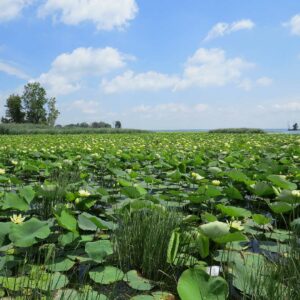May’s News to Us dives into articles that share the history of Pointe Mouillee, the Forest to MI Faucet program, potential key legislation in protecting Michigan waterways against septic spills, new funding for green stormwater infrastructure and updates on the fight over Line 5.
Forest to MI Faucet: Using trees to keep water sources pristine
 Forest to MI Faucet is a program by the Michigan Department of Natural Resources (MDNR) to restore forests and educate the public about the connection between forest health and drinking water quality. Funded by the USDA Forest Service, 12 conservation groups in Michigan were each awarded $50,000 for 3-year initiatives. The groups will focus on strategically planting trees to mitigate the effects of factory farms and urban sprawl and helping municipal water utilities implement source water protection plans. Learn about HRWC’s role as one of the conservation partners.
Forest to MI Faucet is a program by the Michigan Department of Natural Resources (MDNR) to restore forests and educate the public about the connection between forest health and drinking water quality. Funded by the USDA Forest Service, 12 conservation groups in Michigan were each awarded $50,000 for 3-year initiatives. The groups will focus on strategically planting trees to mitigate the effects of factory farms and urban sprawl and helping municipal water utilities implement source water protection plans. Learn about HRWC’s role as one of the conservation partners.
Michigan could become the 50th state to get a septic code

Despite the fact that 30% of residents use septic tanks to dispose of their waste, Michigan is currently the only state in the nation without a statewide septic code. A group of legislators led by Representative Phil Skaggs (D-East Grand Rapids) seek to change this. If passed, House Bills 4479 and 4480 would require all septic systems to be regularly inspected and would create a technical advisory committee to advise Michigan’s Department of Environment, Great Lakes and Energy (EGLE) on septic system management standards. A statewide code is one of HRWC’s top legislative priorities for 2023. Get tips on caring for your septic system.
Monroe County History: Pointe Mouillée has long been site of outdoor recreation
Located at the mouth of the Huron River as it flows into Lake Erie, Pointe Mouillée is a favorite destination of birders, hunters, and trappers in Southeast Michigan. Thanks to the abundance of migratory birds that call it home throughout the year, this marshy area has hosted the Pointe Mouillée Waterfowl Festival for 74 years. Since the 1940’s, the MDNR has worked to protect this marsh and its unique flora and fauna from degradation and pollution. Read more about this special area of the watershed on Page 3 of our Fall 2016 Huron River Report!
Bad River Tribe seeks emergency shutdown of Line 5 due to riverbank erosion
Spring flooding has raised concerns of erosion compromising the integrity of Enbridge’s Line 5, a pipeline that transports petroleum from Wisconsin, through Michigan, to Ontario. Citing erosion concerns and the 30 spills that have already released 1.1 million gallons of oil from the pipeline since 1968, the Bad River Band of Lake Superior Chippewa, are calling on a federal judge to order its shutdown. Line 5 runs through the band’s territory. However, Enbridge notes that the pipeline continues to operate safely and maintains that erosion poses no threat.
SEMCOG grants include rain gardens and bioswales in Southfield and other local projects
The Southeast Michigan Council of Governments (SEMCOG) recently awarded $900,000 to 10 local projects through the Green Stormwater Infrastructure Implementation Program. This money funds projects that aim to reduce the impact of stormwater on our waterways by eliminating over 3 million gallons of runoff annually. The grant allows HRWC to support projects in Wixom and Walled Lake.



